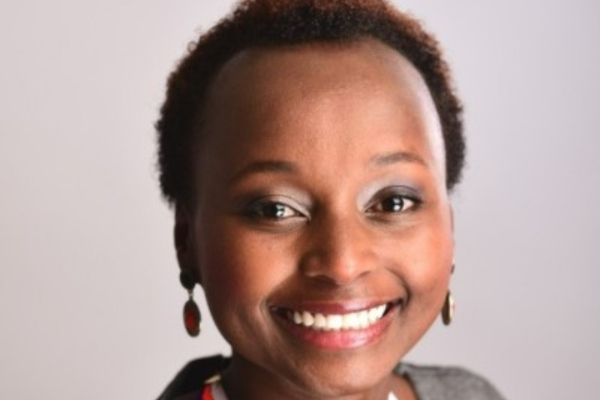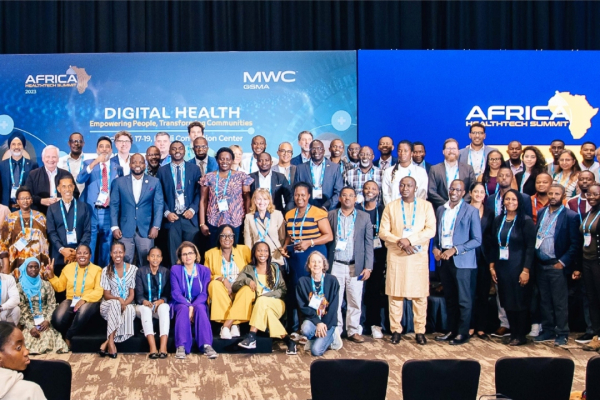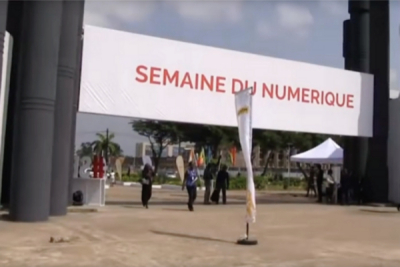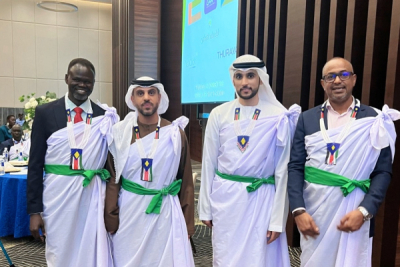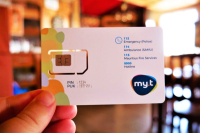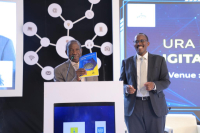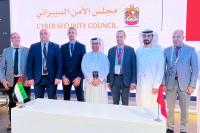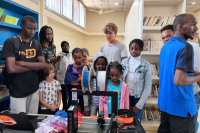Convinced of the potential of artificial intelligence, she uses it to enhance access to healthcare and foster social integration. Her company iZola provides therapists to help neurodivergent children become self-sufficient.
Wamuyu Owotoki (photo) is the co-founder and CEO of iZola, a therapeutic platform that combines health and technology.
Born and raised in Kenya, Wamuyu Owotoki completed her higher education at the University of Hamburg (Germany), where she obtained a PhD in Medicinal Chemistry. She also holds a master's degree in pharmacy from the National Academy of Chemistry and Pharmacy in St Petersburg, Russia.
She founded iZola in 2022 with her husband, Peter Owotoki, an expert in artificial intelligence. The platform offers access to a range of specialists, including speech therapists, occupational therapists, psychologists, music therapists, and pediatric play therapists. It provides tailored therapies that can be accessed from home, facilitating personalized remote learning.
iZola primarily focuses on individuals with autism and other special needs. Its diagnostic system utilizes AI to identify early signs of autism in children and suggest specialized therapies to help these children achieve greater independence.
The iZola team operates from Germany, Kenya, South Africa, Finland, and Switzerland. Presently, the platform assists more than 160 children with therapy and serves over 1,000 parents. On September 25, 2023, it was selected by Google as one of 30 AI startups reshaping the healthcare landscape.
In addition to iZola, in 2019 the Owotoki couple also founded Vitafluence.ai, a data, analytics, and AI company that develops healthcare solutions. The company received a grant from the Bill & Melinda Gates Foundation “to accelerate drug repurposing and discovery for infectious diseases that disproportionately impact low and middle-income countries.” It is also the publisher of the iZola platform.
Before devoting herself to entrepreneurship, Wamuyu Owotoki also worked at the University of Hamburg's Institute of Pharmacy as a research assistant between 2003 and 2005.
Melchior Koba
Africa continues to be the region where health issues hold paramount importance. However, with the progress of technology, the continent may witness a shift in the right direction if the right policies are implemented.
The Mobile World Congress Kigali 2023, held from October 17 to 19, enabled guests and participants to discover the latest mobile telecommunications technologies and discuss the future of mobile in Africa. It was also an opportunity to set up initiatives such as the African Digital Health Network (ADHN), launched on the sidelines of the congress.
The new network will serve as an umbrella organization and a marketplace connecting digital health buyers and sellers.
"We hope to build a network that will bring all innovations and unite digital health stakeholders across the continent. We are going to form a kind of marketplace where buyers and sellers in digital health meet. And we hope to build a technology platform to help do all that," said Jean Philbert Nsengimana, Senior Technology Advisor at the Africa Centers for Disease Control and Prevention (CDC).
According to the project's designers, the network will be a not-for-profit organization, but there are plans to “onboard investments and governments” to ensure its implementation, which will be primarily focused on improving the digital health market. At the launch, 150 members from 43 countries signed up at individual and institutional levels.
The launch of the African Digital Health Network comes at a time when the development of e-health is high on the agenda of African governments. In Senegal, for example, the executive secured nearly $50 million from the World Bank in June to digitize its healthcare system.
In Kenya, by 2030, the widespread adoption of selected digital tools could reduce healthcare spending by between $400 million and $2.5 billion, according to consulting firm McKinsey & Company. Hence, establishing a network is imperative to consolidate the collaborative efforts of all stakeholders, ensuring a promising future for healthcare in Africa through the integration of new technologies.
According to Brian O'Connor, Chairman of the global community ECHAlliance, the network will also highlight Africa's digital healthcare innovations and offer access to global partners through a centralized platform.
Samira Njoya
The Saudi technology firm wants to expand across Africa, particularly in the Arab region. To achieve this, it is teaming up with strategic partners.
Last week, Saudi-based digital services and solutions provider Elm signed a memorandum of understanding with CyShield, an Egyptian AI and cybersecurity company.
The MoU, signed at Gitex Global in Dubai, is aimed primarily at promoting the Saudi firm's expansion in Africa, starting with Egypt.
The two parties will need to establish a framework for bilateral cooperation based on common interests, to achieve their respective objectives. According to Majid Al Arifi, official spokesperson and director of marketing at Elm, in addition to expanding its footprint through various partnerships with companies operating in the technology sector, this agreement will enable the company to explore and evaluate opportunities in regional and international markets and to collaborate on the creation of new joint digital ventures.
At Gitex Africa in Marrakech (Morocco) last May and June, Elm signed a partnership with Senegal Numerique, the agency in charge of the management of Senegal’s digital infrastructure, to foster digital inclusion in the country.
With over 30 million users and 700,000 corporate customers, Elm aims to provide its Egyptian partner with the tools it needs to strengthen its position as a major player in Egypt’s digital transformation landscape.
According to Al Arifi, strengthening Elm's regional partnerships is a key pillar of efforts to ensure a technological infrastructure that supports digital transformation in the Arab region and on the African continent. It also enables companies to deliver services via digital platforms, guaranteeing maximum efficiency and reliability.
Adoni Conrad Quenum
On Wednesday, October 18, Benin’s Ministry of Digital Affairs and Digitizationannounced the 2023 edition of itsyearlyevent SENUM (Digital Week) wouldbeheldfromNovember 6 to 10 at the Congress Center of Cotonou. This year, the eventwillbeheldaround the theme “Emerging technologies to accelerate the digital transformation of States.”
Recognizing the necessity of affordable and high-quality Internet services for an effective digital economy, the South Sudanese government and its partners have been working, for years now, to strengthen local data capabilities.
Thuraya Telecommunications Company and YahClick, two subsidiaries of Al Yah Satellite Communications Company (Yahsat), a leading provider of satellite solutions in the United Arab Emirates, announced on Monday, October 23 the signing of a partnership agreement with Gate for Technologies (G4T), a company offering integrated systems design and communications services in South Sudan. One of the aims of the partnership is to provide satellite connectivity solutions in several high-growth sectors in South Sudan.
As part of the partnership, Thuraya's satellite technology will be deployed in the country to connect remote communities. Yahsat will also collaborate with humanitarian agencies based in South Sudan, providing essential connectivity to support underserved areas.
"The new service partner agreement with Gate for Technologies reinforces our commitment to South Sudan and Africa. As the country seeks to rebuild critical sectors of the economy, consistent and reliable connectivity will increasingly play an integral role in furthering socio-economic development," said Ali Al Hashemi, Yahsat Group CEO.
The partnership, which began its implementation with the launch of Thuraya and YahClick services in the country, is part of efforts by the government and its partners to develop the national telecommunications infrastructure and provide e-government services.
The service agreement will leverage G4T's market presence and partnerships with government entities, non-governmental organizations (NGOs), and mobile network operators (MNOs) to develop the telemedicine, education, and oil and gas sectors. It is a response to the growing demand for connectivity solutions but, its ultimate aim is to help accelerate growth, development, and digital transformation in the country.
Samira Njoya
To tackle youth unemployment, this edtech company has set up a program aimed at assisting young individuals in acquiring additional skills via workshops and online courses.
Crafty Workshop is an edtech platform developed by an Egyptian startup, founded in 2019. It gives users access to online courses and video content in fields such as crafts, technology, and photography.
The solution does not have a mobile application. It is accessible through its web platform and an account is required to access its services. Users can take courses every day and at any hour of the day.
Its free courses are accessible for free but, paid courses require a subscription, which costs 150 Egyptian pounds ($4.85) monthly and 500 pounds yearly. Subscription gives access to premium content and can be shared with a friend or family member. The platform also features an online marketplace where artisans can create virtual stores to sell their wares. Users can also register as trainers and share their knowledge by giving online courses and/or running an online store.
Last week, the platform announced the successful completion of a $400,000 funding round to, among other things, improve its technology and diversify its offerings. Its co-founder Hadeer Shalaby also explained that the funds will serve, among other things, to extend the startup’s reach to the Gulf region and enrich the content library.
Adoni Conrad Quenum
The Mauritian government recently announced that new mobile identification measures would become enforceable on October 31, 2023.
According to authorities, from the aforementioned date, all current cell phone subscribers will have to re-register their SIM or Esim cards. The main aim is to ensure that every SIM card in use is registered in the name of the individual using it, thereby strengthening subscriber protection against identity theft, various forms of fraud, and malicious practices.
The Uganda Revenue Authority (URA) recently unveiled its Digitalisation and IT Strategy 2023/24-2027/28.
This five-year strategy aims, among other things, to improve services to taxpayers, modernize URA systems, streamline online services, and develop a high-performance, diverse workforce, all thanks to cutting-edge technologies. It also aims to create a reliable, secure, and interoperable digital environment that makes it easier for taxpayers to meet their tax obligations.
In recent years, Gitex Global has established itself as one of the leading events in the global technology ecosystem where players meet and seal partnerships.
Last October 19, Morocco’s Directorate General for Information Systems Security (DGSSI) and United Arab Emirates's Cybersecurity Council signed a memorandum of understanding to strengthen cybersecurity cooperation between the two countries.
In the framework of that MoU – signed on the sidelines of Gitex Global in Dubai, the two entities will set up a joint committee to plan and oversee the implementation of various activities aimed at responding to cyber-attacks, which are constantly on the rise due to the acceleration of digital transformation. The committee will hold annual meetings as required, alternating between Morocco and the United Arab Emirates.
In recent years, Morocco has multiplied investments and partnerships to secure its cyberspace, government information systems, and public institutions, among other targets. In May 2022, an agreement was signed with Deloitte Morocco Cyber Center to promote scientific and technological research in cybersecurity. At Gitex Africa, held in Marrakech from May 31 to June 2, authorities signed a memorandum of understanding with the French company Mazars. Under that MoU, the French company will invest $7.5 million for the creation of an excellence center specializing in data analytics, artificial intelligence, and cybersecurity.
According to the International Telecommunication Union's Global Cybersecurity Index 2020, Morocco is one of the African champions in the sector, along with South Africa, Nigeria, Kenya, and Egypt. It ranks 50th internationally. It has already ratified the Budapest Convention on Cybercrime (in 2015) and also created a legal framework and specialized institutions to improve its cyberattack preparedness.
Let’s note that according to the "Cybersecurity in Africa-Call to Action" report published in June 2023 by the firm Kearney, African countries are not investing enough as mature markets do. In terms of strategy, governance, operational entities, and cross-sector cooperation, the firm concludes that the continent's ability to resist, adapt, and recover from cyberattacks is weak.
Adoni Conrad Quenum
Gambia Tech Project is a commendable project that contributes to the development of the technology ecosystem in The Gambia. It provides networking opportunities for young entrepreneurs while playing a crucial role in training the next generation of technology leaders in Africa.
Gambia Tech Project is a program launched in 2021 by the French Embassy, in collaboration with the cultural center Alliance Française de Banjul. It aims to foster and actively participate in the development of a tech ecosystem that provides opportunities and facilitates innovations for young Gambian entrepreneurs.
Hosted by Alliance Française de Banjul, it is coordinated by project manager Boubacar D. Coly. It has a dedicated incubation space and a publicly accessible technology lab, where entrepreneurs can access various resources and services, such as training, workshops, events, mentoring, advice, and funding.
The project offers "young entrepreneurs a unique opportunity to achieve their goals through technology. Our main objectives are to provide quality human resources and entrepreneurs in The Gambia, because we have very creative people, but the problem lies in their limited vision," said Boubacar Coly in 2021.
Gambia Tech Project’s stated goal is to support and coach up to 50 people and incubate, accelerate, and finance up to 10 startups yearly. It creates business networking opportunities and usually organizes two major tech-entrepreneurship events every year.
Among the Gambia Tech Project's initiatives is the Gambia Tech Entrepreneurship Program. This program supports entrepreneurs who have an idea or already have a business in the fields of agritech, edtech, fintech, multimedia, creative arts, sustainable solutions, healthtech, smart cities, and information and data sciences, among others. The registration phase for the 2024 edition was launched on October 16 and will close on November 5, 2023.
Gambia Tech Project has also supported several other initiatives, including the Fireside Chat and Pitching Competition, which was hosted in January 2023 by Amie Jack, Product Manager at Microsoft.
To date, the Gambia Tech Project has assisted 275 entrepreneurs, supported 60 viable projects, and incubated 10 startups. These include Hightech Show, which promotes digital literacy through media and content creation, and Green Waste Initiative, a company specializing in the production and sale of fuels made from solid organic and agricultural waste.
Melchior Koba
More...
In Africa, the ongoing digital transformation has accelerated over the past few years. This affects every sector and player, including SMEs, which play key roles in the African economy.
The Namibian Investment Promotion and Development Board (NIPDB) and the Estonian Development Council (EstDev) recently signed an agreement launching “Entrepreneurship Minds”, a partnership aimed at developing the digital capabilities and skills of Namibian micro, small, and medium-sized enterprises (MSMEs), local media outlets reveal.
The new program, implemented in collaboration with Estonia’s Tallinn University of Technology, also aims to provide financial support and high-quality training for SMEs. The aim is to empower and unlock Namibia's untapped business potential, with an emphasis on technology and e-commerce.
According to Dino Ballotti, Executive Director of the MSME Business Development Investment Committee at NIPDB, the program comes at a particular time in the cooperation between Namibia and Estonia. EstDev's "African Regional Strategy 2020-2030 positions Namibia as a key collaborator for Estonia. Moreover, Estonia's investment in pioneering a digital transformation and fostering entrepreneurship resonates with Namibia's strategic vision, especially when considered alongside the European Union's green hydrogen initiative," he said.
The program was launched after a visit, to Estonia, by the Namibian Investment Promotion and Development Board last May. It is part of the actions taken by Estonia, since 2013, to support the digitization of Namibia’s public sector. To date, Estonia has supported a dozen digital projects, to the tune of around €750,000.
Ultimately, the program will foster startup ecosystems, finance innovative local solutions to development challenges, and strengthen the economy. According to the Namibian Statistics Agency, SMEs contribute around 12% to the country's GDP and employ over 200,000 people.
For Nelli Timm, EstDev's Regional Advisor for Africa, this new project will play a central role in strengthening Namibia's SME sector through the development of digital capabilities and skills. "This ambitious partnership between Namibia and Estonia promises to not only unlock business potential but also to foster digital innovation and economic growth in the region," she said.
Samira Njoya
At the national stage, it competed against 245 applicants. On the international stage, they were well over 1300.
Cameroonian startup Services for Aged –founded by Cameroonian-born Olivia Kamga (photo, left)- quickly gained credibility in the national and international tech community in recent months. Launched in mid-2023, it has already won two awards for its digital platform that connects the elderly with home care in rural areas.
The two awards were issued by French telecom group Orange in the framework of its Orange Social Venture Prize in Africa and the Middle East (POESAM) competition. At the national stage, the startup won the “special women’s prize”, on July 20. Last October 18, it also won the "Coup de Coeur" in Kigali, Rwanda, in the framework of the international phase, whose winners were unveiled on the sidelines of the Mobile World Congress Africa 2023.
Services for Aged gives busy rural populations and the diaspora the ability to hire care personnel to look after their elderly relatives. The startup specifically targeted the elderly in rural areas given that they are often vulnerable to social exclusion, isolation, and health problems.
It offers four types of monthly and à la carte subscriptions. They include medical and preventive care, personal hygiene and body care, home consultations, shopping, leisure, and social activities, among others with regular care reports sent to its subscribers. Its services are available in several regions across Cameroon, including the Centre and the West regions. To meet the growing demand for its services, the startup has deployed a network of qualified caregivers across the country.
With its mobile and desktop applications, Services for Aged demonstrates that the digital transformation ongoing in Africa, and Cameroon in particular, offers the opportunity to maintain social ties with loved ones, even remotely.
Artificial intelligence has gained enormous ground in recent years, enhancing the power of existing tech solutions. In Africa, Dumebi Okwechime leverages that technology to develop affordable and flexible banking products for all types of businesses.
Dumebi Okwechime (photo) is the founder and Chief Data Scientist of Izifin, a provider of integrated finance solutions that enable all businesses to harness data to serve their customers better.
The Nigerian-born founder has an impressive academic and professional background in artificial intelligence and data science. In 2011, he got his PhD in Computer Vision from the University of Surrey in the UK and an MBA from Imperial College London, in 2015.
During his doctoral studies, he created an artificial intelligence platform that determines how interested participants are in analyzed conversations based solely on their non-verbal social signals.
He founded Izifin in 2021. Through that company, he offers flexible and affordable embedded banking products to all types of businesses, whatever their size or sector.
The company offers three main products. The first is IZI KYC, which enables fintechs to validate their users through facial detection, proof-of-life, facial matches, and identity verification. The second is IZI BNPL, which enables companies to offer Buy now, pay later (BNPL) services to their clients. The third product is IZI MERCHANT, an embedded banking solution that enables businesses to digitalize processes, easily manage inventories, perform cashier services, and manage customer portfolios.
On October 5, 2023, Izifin and 10 other startups were selected to join the Google for Startups Accelerator: AI First program. The company will benefit from $350,000 in Google Cloud credits and access Google's expertise and support in artificial intelligence.
Prior to founding Izifin, the entrepreneur worked for major companies such as Siemens, where he was a technical consultant and software engineer between 2003 and 2004. After years in academia, he worked for companies such as fintech Renmoney, where he was Chief Decision Scientist (2019-2020), and logistics startup Kobo360, where he was Chief Data Officer (2020-2021).
Melchior Koba
In Africa, the digital ecosystem still has enormous potential to stimulate economic recovery, promote opportunities, advance social equality, and create jobs. It is therefore urgent to develop this ecosystem through North-South partnerships.
On Tuesday, October 17, Léon Juste Ibombo (photo, right), Congo’s Minister of Posts, Telecommunications and Digital Economy, granted an audience to Eugene Stewart Young (photo, left), US Ambassador to the Republic of Congo.
The two officials discussed, among other things, strengthening cooperation between the United States and Congo in the digital economy and postal sectors.
According to Eugene S. Young, the purpose of the meeting was to define areas of digital cooperation and identify projects to be implemented shortly. "We also talked about our priorities, the Embassy's priorities, the Minister's priorities, and new developments in the telecommunications sector. I look forward to continuing the discussions with the Congolese side," he said.
This new initiative is fully in line with the strategy put in place by the Ministry of Telecommunications to kick-start the development of the digital economy in Congo. In recent years, the country has implemented initiatives to attract international partners. The aim is to multiply collaborations that could lead to the construction of new digital infrastructures, the development of digital skills in the public and private sectors, the modernization of services, and the provision of quality Internet connection.
The audience comes after the US government's decision, in December 2022, to devote $55 billion to Africa over three years for the development of several sectors, including digital, through the Digital Transformation in Africa (DTA) initiative.
Samira Njoya


